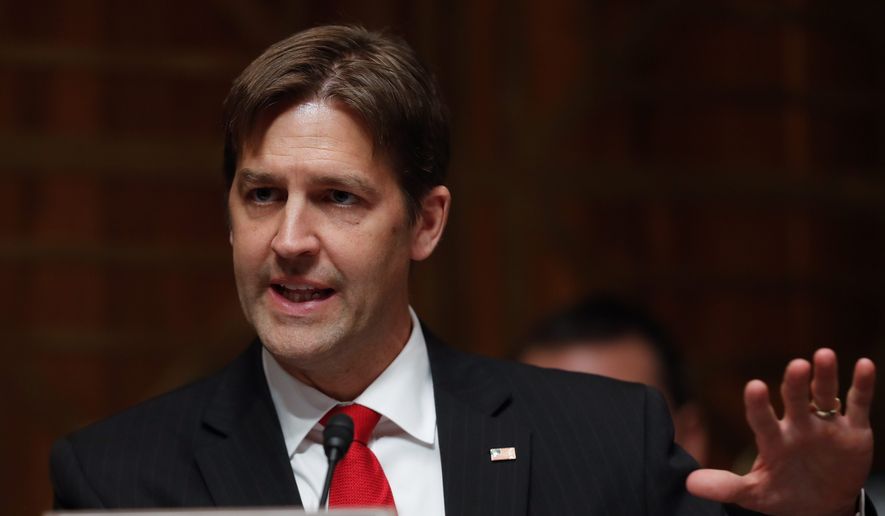The American Bar Association said Wednesday it didn’t ask one of President Trump’s judicial nominees about his personal opinions on abortion, saying the ABA’s negative evaluation of him was instead based on peers who doubted he could leave his politics behind if he becomes a federal judge.
Pamela Bresnahan, chair of the ABA’s Standing Committee on the Federal Judiciary, was defending her organization’s role in the vetting process for federal judges, which involves rating a president’s picks.
In the latest case of Leonard Grasz, nominated to the 8th U.S. Circuit Court of Appeals, the ABA rated him “not qualified.” He’s one of four Trump picks to get the lowest possible grade so far.
During his confirmation hearing earlier this month, he alleged the organization gave him the poor review after asking about his personal stance on abortion, while negatively referring to conservatives and Republicans as “you people.”
Ms. Bresnahan denied that claim in testimony to the Senate Judiciary Committee.
“The evaluators upon questioning the peers came to the conclusion that he could not be open minded, free from bias, when he made the jump from advocate to judge,” she said. “Peer reviews said over and over again, ‘We do not think he can follow the law.’”
Democrats have called the ABA’s rating the “gold standard” for evaluating judicial picks, and have suggested low ratings should be a black mark against nominees, but Republicans have been more skeptical.
Sen. Ben Sasse, Nebraska Republican, told Ms. Bresnahan the American Bar Association is a “liberal advocacy organization.”
“You have First Amendment rights,” said Mr. Sasse. “What’s not OK is being a liberal advocacy organization and be masquerading as a neutral, objective evaluator of these judicial candidates.”
Sen. Ted Cruz, Texas Republican, said out of the 15 people on the American Bar Association’s Standing Committee on the Federal Judiciary, none have donated to pro-life organizations, but a couple have donated to Emily’s List, an organization dedicated to electing pro-choice candidates. He also said there’s a political party bias.
“In terms of presidential campaigns, three of the 15 [committee members] donated to Hillary Clinton’s campaign,” said Mr. Cruz. “Of the 15, zero donated to President Trump’s campaign, [Mitt] Romney’s campaign, or John McCain.”
The Texas senator also took issue with the ABA evaluators who interviewed Mr. Grasz, saying one had donated to a number of Democratic politicians including Mrs. Clinton, former President Barack Obama, Sen. Elizabeth Warren of Massachusetts and Sen. Kamala Harris of California. He said the other evaluator had opposed Supreme Court Justice Samuel A. Alito’s confirmation because his record was “insufficiently pro-choice.”
Ms. Bresnahan said their evaluations aren’t tainted by the lawyers’ own personal politics.
“The committee has spent hundreds of hours both as evaluators and reviewers,” she said.
The Judiciary Committee’s top Democrat Sen. Dianne Feinstein of California said if the allegations were true about the American Bar Associations’ political bias, then 49 of Mr. Trump’s 53 nominees wouldn’t have had qualified ratings.
“The statistics don’t indicate that that’s the case,” she said.
None of Mr. Obama’s judicial nominees were given a “not qualified” rating by the American Bar Association, according to a Congressional Research Service report, while seven of President George W. Bush’s picks earned the low score. President Bill Clinton had four.
The committee also heard from two of Mr. Trump’s nominees for the 5th U.S. Circuit Court of Appeals on Wednesday, James Ho and Texas Supreme Court Justice Don Willett.
Justice Willett drew most of the questions from senators, who asked about his prolific use of Twitter. Mr. Willett said he wasn’t sure if he would stop tweeting even if he were to be confirmed.
Sen. Al Franken, Minnesota Democrat, specifically questioned Justice Willett about a tweet sharing a Fox News article on a transgender student wanting to play on a high school softball team. The justice added the comment “Go away A-Rod” to the tweet.
Justice Willett called the tweet a joke.
“A-Rod had just recently accepted his year long suspension from Major League Baseball and that happened at the same this article came out, and I think it was admittedly a ham-handed attempt at levity,” he said.
“Any human being looking at that, looks at that as a disparagement of her, as making fun of her playing softball on a men’s team, telling her to go away,” said Mr. Franken. “Does this display the kind of judgment that we want for a lifetime appointment to the federal judiciary?”
• Alex Swoyer can be reached at aswoyer@washingtontimes.com.




Please read our comment policy before commenting.